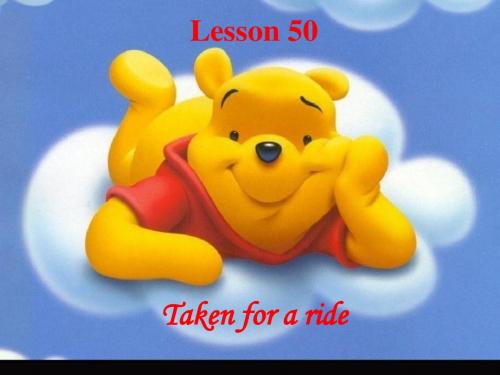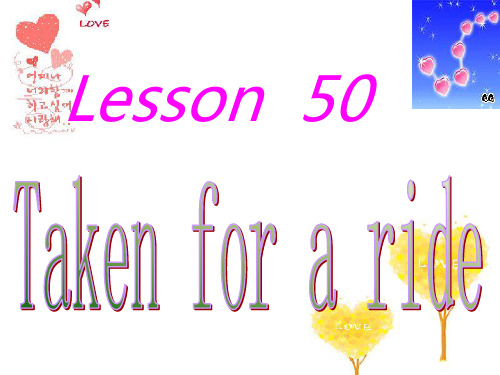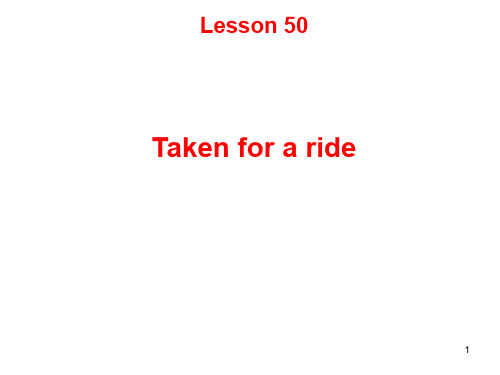新概念第二册50课课件
合集下载
新概念二册50课课件

New words and expressions
ride
1) n. (搭乘交通工具的)旅行 eg. a bike ride / a train ride It’s only 5 minutes’ bus ride to school. 2) v. 骑,乘(马,自行车,汽车等) eg. ride a pony, bicycle
Iv. Language points
1. I love travelling in the country, but I don't like losing my way. love/like doing sth eg. I love having dinner with you, but I don't like paying for dinner. love/like to do sth proverb:Love me, love my dog. the country = the countryside = rural area city = urban area suburban area
sth take sb some time 做某事花费某人多少时间 eg. My trip took me a long time. • it takes/took sb some time to do sth eg. It took us thirty minutes’ car ride from here to the airport.
Iv. Language points
2. I went on an excursion recently, but my trip took me longer than I expected. go on an excursion = have an excursion similar expressions: go on holiday/a trip/ a journey
新概念2 第50课 课件

excursion n.远足 recently adv.最近 expect v.期盼 Woodford Green 伍德福德草地 conductor n.售票员 view n.景色 realize v.意识到 shock n.震惊
excursion n. 远足,旅行(集体)
• • • • an excursion train 游览列车 an excursion ticket 旅游特惠票 excursion into sth . 涉足,涉猎 He has an excursion into science.
③country
⒈ 国家(cn)
2.农村(un)
countryside 乡村,暗念偏僻之意
从政治角度来讲:
rural area 农村 suburban area郊区 urban area市区
• Expect, Wait for
• expect可以表示“预计……可能发生(或来到),等待, 期盼”,它表示等待时往往侧重人的心理而不是具体在 某个地方等。 • I expect / I’m expecting to hear from you. • I’m expecting the bus to arrive in the next ten minutes. • My trip took me longer than I expected.
journey,tour,travel,trip,voyage, excursion,expedition
• journey最普通用词,侧重指时间较长、距离较远的单程 陆上,水上或空中的旅行。重点在距离 • tour指最后返回出发地,旅途中有停留游览点,距离可长 可短,目的各异的周游或巡行。 • travel泛指旅行的行为而不指某次具体的旅行,多指到远 方作长期旅行,不强调直接目的地,单、复数均可用。 • trip普通用词,口语多用,常指为公务或游玩作的较短暂 的旅行。 • voyage指在水上旅行,尤指海上旅行,也可指空中旅行。 • excursion较正式用词,常指不超过一天的短时期娱乐性 游玩,也可指乘火车或轮船往返特定景点的远足旅游。 • expedition指有特定目的远征或探险。
新概念二第50课课件

'but I don't know where it is.’
'I'll tell you where to get off,' Answered the tceollnsdbuwcthoer.re to get off“教训某人行为规矩点或 I识s相at点in”the front of the bus to get a good view of the countryside.
'We're going back now,' said the conductor.
'Well, in that case, I prefer to stay on the bus.' I answered. prefer sth. to sth. He prefers cats to dogs. 他喜欢猫,而不喜欢狗。
03
Text
love/ like doing sth. 强调一种习惯 I love travelling in the country, but I don't like losing my way. lose one's way 迷路
I went on an excursion recently, but my tgriopotnooaknmexecluornsgioenr =thhaanvIeeaxnpeecxtceudr.sion 'I' m gotainkge tsob.WsoomodefotirmdeGr花ee费n,某' 人多少时间 I said tthoatnheI ecxopnedcutcetdor比a我s 所I g预o料t o的n(th口e语bu)s,
Exercise
'I'll tell you where to get off,' Answered the tceollnsdbuwcthoer.re to get off“教训某人行为规矩点或 I识s相at点in”the front of the bus to get a good view of the countryside.
'We're going back now,' said the conductor.
'Well, in that case, I prefer to stay on the bus.' I answered. prefer sth. to sth. He prefers cats to dogs. 他喜欢猫,而不喜欢狗。
03
Text
love/ like doing sth. 强调一种习惯 I love travelling in the country, but I don't like losing my way. lose one's way 迷路
I went on an excursion recently, but my tgriopotnooaknmexecluornsgioenr =thhaanvIeeaxnpeecxtceudr.sion 'I' m gotainkge tsob.WsoomodefotirmdeGr花ee费n,某' 人多少时间 I said tthoatnheI ecxopnedcutcetdor比a我s 所I g预o料t o的n(th口e语bu)s,
Exercise
新概念英语第二册第50课-Taken-for-a-ride-乘车兜风PPT幻灯片

• review v. 复习 • preview v. 预习 • interview v. 面试 • overview n. 概述
5
5. lose v. (lost lost )
• lose sb. way • lose a game/war • get lost • {类}loose adj.松散的
10
distance
• a. c.n.&u.n. 距离;间距 e.g. A good cyclist can cover distances of over a
hundred miles a day. 自行车骑得好的人一天可以行驶一百多英里.
• b. c.n.&u.n 远方;远处 e.g. At a distance of six miles you can’t see much. 距离六英里以外的东西很难看清。
What a ride!
• . vt.&vi. (ride, rode, ridden) He jumped on his horse and rode away. Can you ride a horse? 注: ride 用于骑马、骑自行车时,常用作
vt., 即ride a horse; ride a bike; • 用于乘公共汽车时、乘火车时,常用作or a ride • take…for… 把……当作…… • taken for a ride 就当作是一次兜风 • take sb. for a ride 欺骗 • taken for 上当了
8
• 用作名词: go for a ride in a car 乘车出去兜风。 Can I have /take a ride on your bike?
Lesson 50
5
5. lose v. (lost lost )
• lose sb. way • lose a game/war • get lost • {类}loose adj.松散的
10
distance
• a. c.n.&u.n. 距离;间距 e.g. A good cyclist can cover distances of over a
hundred miles a day. 自行车骑得好的人一天可以行驶一百多英里.
• b. c.n.&u.n 远方;远处 e.g. At a distance of six miles you can’t see much. 距离六英里以外的东西很难看清。
What a ride!
• . vt.&vi. (ride, rode, ridden) He jumped on his horse and rode away. Can you ride a horse? 注: ride 用于骑马、骑自行车时,常用作
vt., 即ride a horse; ride a bike; • 用于乘公共汽车时、乘火车时,常用作or a ride • take…for… 把……当作…… • taken for a ride 就当作是一次兜风 • take sb. for a ride 欺骗 • taken for 上当了
8
• 用作名词: go for a ride in a car 乘车出去兜风。 Can I have /take a ride on your bike?
Lesson 50
新概念英语第二册Lesson50课件

'Well, in that case, I prefer to stay on the bus,' I answered.
in that (this) case 如果那样(这样)的话 Is he one of your best friends?
In that/this case, you may invite him.
lose one’s way 迷路
I went on an excursion recently, but my trip took me longer than I expected.
go on an excursion =have an excursion 作一次短距离的旅行/去远足 take sb. +时间 花费某人…时间 My trip took me a long time.
thought.
‘I’m going to Woodford Green,’ I said to the conductor as I got on the bus, ‘but I don’t know where it is.’
get on the bus/train get off the bus/train get into the car get out of the car
3 客观事实和普遍真理。 The earth is smaller than the sun. He said that the sun rises in the east.
4 表示一种自然现象。 Days are long in summer. Winter comes after autumn.
excursion
n. 远足,游玩, 郊游
新概念英语第二册第50课课件

• 1.-- What's his brother?
• -- He is a teacher. He ____ maths at a school.
• A. teach
B. teachs
• C. taught
D. teaches
• 2. Those papers _______ me.
• A. is
• A. spent
B. will spend C. has spent
D. spends
• 3. Now my father _____ his bike to work every day instead of driving. 【上海】
• A. ride
B. rode
C. rides
D. will ride
'I'll tell you where to get off.' answered the conductor.
I sat in the front of the bus to get a good view of the countryside.
After some time, the bus stopped. Looking round, I realized with a shock that I was the only passenger left on the bus. 'You'll have to get off here,' the conductor said. 'This is as far as we go.’ 'Is this Woodford Green?' I asked. 'Oh dear,' said the conductor suddenly. 'I forgot to put you off.’ 'It doesn't matter,' I said. 'I'll get off here.’ 'We're going back now,' said the conductor. 'Well, in that case, I prefer to stay on the bus,' I answered.
新概念英语第二册50课PPT课件
3.What did the writer realize when the bus stopped?
4.Why did the writer not get off the bus at woodford Green?
A: Woodford Green.
No, he didn't.
A: The conductor promised to tell him where
lose one's job lose one's temper lose weight / put on weight lose one's cool 怒不可遏 lose one's face lose one's head 昏头了,冲动 lose one's life 遇害,丧生 lose one's breath 上气不接下气
to get off.
A: The writer realized the conductor had
forgotten to put him off.
A: Because the bus would go back and pass
Woodford Green.
Language Points:
1. Taken for a ride
3. miss v. 想念,错过 eg: We must hurry or we'll miss the train. I miss you very much.
lost missing gone
﹡lost 表示“丢失”,含有失去后难以找回的意味 ,在句中可作定语,表语和补语。 eg: The parents found the lost child at last. His elder brother was lost at sea.
新概念英语第二册第50课-Taken-for-a-ride-乘车兜风PPT幻灯片
10
distance
• a. c.n.&u.n. 距离;间距 e.g. A good cyclist can cover distances of over a
hundred miles a day. 自行车骑得好的人一天可以行驶一百多英里.
• b. c.n.&u.n 远方;远处 e.g. At a distance of six miles you can’t see much. 距离六英里以外的东西很难看清。
他态度冷淡是因为他势利眼呢, 还是因为他腼腆?
distance
phrase:
• in the distance在远处 • at a distance相距,相隔 • from the distance 由远处 • distance learning 远程教育 • keep sb. at a distance 与某人保持一定距
As far as I am concerned 就我而言…… eg. As far as I am concerned, computer games are harmful to us.
22
8. “Is this Woodford Green?”asked. “Oh dear,”said the conductor suddenly.“I forgot to put you off.” “It doesn't matter,”I said.“I'll get off here.”
7
【课文讲解】 1、Taken for a ride • take…for… 把……当作…… • taken for a ride 就当作是一次兜风 • take sb. for a ride 欺骗 • taken for 上当了
distance
• a. c.n.&u.n. 距离;间距 e.g. A good cyclist can cover distances of over a
hundred miles a day. 自行车骑得好的人一天可以行驶一百多英里.
• b. c.n.&u.n 远方;远处 e.g. At a distance of six miles you can’t see much. 距离六英里以外的东西很难看清。
他态度冷淡是因为他势利眼呢, 还是因为他腼腆?
distance
phrase:
• in the distance在远处 • at a distance相距,相隔 • from the distance 由远处 • distance learning 远程教育 • keep sb. at a distance 与某人保持一定距
As far as I am concerned 就我而言…… eg. As far as I am concerned, computer games are harmful to us.
22
8. “Is this Woodford Green?”asked. “Oh dear,”said the conductor suddenly.“I forgot to put you off.” “It doesn't matter,”I said.“I'll get off here.”
7
【课文讲解】 1、Taken for a ride • take…for… 把……当作…… • taken for a ride 就当作是一次兜风 • take sb. for a ride 欺骗 • taken for 上当了
新概念二 Lesson50 课件
Discussion
trip travel journey voyage flight tour 的区别
1. journey指从一地到另一地,通常指陆地上的远距离“旅行”,有时也可以表示经常走的或长 或短的“路程”。只作名词。例如: I took a journey from Beijing to Shanghai last year. -How long is your journey to school? --Only about 10 minutes. 2. voyage主要指远距离的水上旅行,也可以指空中旅行意思为“航海、航空、航行”等。只作 名词。例如: She usually gets seasick during the voyage. 3. trip 一般指时间短、距离近的“旅行、远足”,也可以指长途旅行。在非正式用语中可代替 journey。只作名词。例如: I will be on a trip to / journey to the south next summer holiday. 4. tour 着重指旅行线路比较曲折,常表示“(周游各地的)参观、访问、(巡回)旅游、视察、 购物、演出”等意思。可作动词和名词。例如: I will tour the world in the future. / My father has gone down-town on a shopping tour. 5. travel作“旅行、游历”解,一般表示从一地到另一地旅行这一总的概念。常指长时间、远 距离的“旅行”。尤指出国旅行。可作动词和名词。其复数形式意思为“旅游笔记”、“游 记”。例如: At present, many people are fond of travel in their spare time. 6. flight 主要指空中飞行
~高二英语新概念第二册lesson 50课件(共23张)
7. in that case I have forgotten to do my homework, Miss Hu. ---In that case,… What will you do if an earthquake/fire breaks out? In that case,…
Sentence imitating
The writer wanted to go to Woodford Green but as he did not know the way, and the conductor promised to tell him where to get off. When they arrived at the bus terminus, the writer asked if they were at Woodford Green. The conductor then realized that he had forgotten to put him off. The writer stayed on the bus because it was going back.
在此句中可取代宾语从句
eg. 1. I don’t know what I should do. = I don’t know what to do. 2. Can you tell me how I can get there. = Can you tell me how to get there. 3. I don't know which I should choose. = I don't know which to choose.
4. get a good view of
Standing on the top of Hushan, we can get a good view of Fuyang.
- 1、下载文档前请自行甄别文档内容的完整性,平台不提供额外的编辑、内容补充、找答案等附加服务。
- 2、"仅部分预览"的文档,不可在线预览部分如存在完整性等问题,可反馈申请退款(可完整预览的文档不适用该条件!)。
- 3、如文档侵犯您的权益,请联系客服反馈,我们会尽快为您处理(人工客服工作时间:9:00-18:30)。
prefer sth to sth 表示 “宁要…而不要”,to是介词:
He prefers cats to dogs. 他喜欢猫,而不喜欢狗。
prefer to do sth & prefer doing sth 见前 (love to do sth & love doing sth)
本课必须掌握的词组:
11 Did you look round? . Yes, I did. 12 Why were you shocked? Because I realized that I was the only passenger left on the bus. 13 What had the conductor forgotten? To put me off at Woodford Green. 14 Were you angry with him? No, I wasn't.
除了以上动词外,另外有些表示所属关系以及喜好、憎恶、 需要等感情的动词通常也只用于一般现在时而不用进行时 的。这些动词包括: belong to(属于), consist of(由…组成), contain (包含;包括), desire(期望;希望), dislike(不喜 欢), hate(憎恨), hope(希望), love(爱), matter (有关系;要紧), mean(意思是;意谓), mind(介 意), need(需要), want(想要),பைடு நூலகம்wish(希望;愿 望)。 This box contains 48 matches.盒子里有48根火柴。 Those papers belong to me.这些报纸是我的。 He needs a new pair of shoes. 他需要一双新鞋。 I hate writing letters.我讨厌写信。
as far as (有时so far as) 表示 “远到,直到…为止”; “(表示范围、程度)就…, 尽…”: The fire spread as far as the park. 火势蔓延到公园。
I‟ll help you as/so far as I can. 我会尽力帮助你的。
8. „Is this Woodford Green?‟ I asked. „Oh dear,‟ said the conductor suddenly. „I forgot to put you off.‟ “ 这里是伍德福德草地吗?” 我问道。 “ 哎呀,” 售票员突然说, “ 我忘了让您下车了。” oh dear 是一个感叹用语。 put off的含义之一是“让……下车(或飞机、船等)”: They put me off at a small station. 他们让我在一个小站下了车。
3. „I‟m going to Woodford Green,‟ I said to the conductor
as I got on the bus, „but I don‟t know where it is.‟ “ 我要去伍德福德草地,” 我一上车就对售票员说, “但 我 不知道它在哪儿。”
Lesson 50 Taken for a ride
乘车兜风
本课内容:
单词
语法
课文逐句讲解
本课必须掌握的词组
复述课文
理解课文回答问题,练习一般疑问句和特殊疑问句
课后习题详细讲解
New words and expressions 生词和短语 ride n. 旅行 excursion n. 远足 conductor n. 售票员 view n. 景色
2. I went on an excursion recently, but my trip took me longer than I expected. 最近我作了一次短途旅行,但这次旅行所花费的时间比我 预计的要长。 (1)Go on an excursion 作一次郊游 Excursion 指 “短途旅行,远足,集体游览”,着重在短 距离而准备迅速返回的游览、娱乐活动。表示 “旅行” 之意的名词通常与go on连用,它在这里的含义为“为 (某一目的)而去”: I'll go on holiday next month. 我下个月去度假。 Did you go on a trip last month? 你上个月去旅行了吗
5.I sat in the front of the bus to get a good view of the countryside. 我坐在汽车的前部,以便饱览农村风光。
in front of & in the front of in front of 指在某一物体外的前面,其反义词为behind; in the front of 指某一物体里面的前部分,有时用at the front of,其反义词是at the back of。 比较: The man is sitting in the front of the car. 那个男人坐在车的前部。(在驾驶员旁边) The man is sitting in front of the car. 那个男人坐在车的前面。(车的外面)
6. After some time, the bus stopped. Looking around, I realized with a shock that I was the only passenger left on the bus. 过了一些时候,车停了。我环视了一下四周,惊奇地发现 车里就只剩我一个乘客了。 looking around 是现在分词短语,作时间状语。
本课语法 :一般现在时 在第2课中,我们讲了一般现在时用于表达“有规律的, 或是习惯性的动作”。(often/always) 在第26课中,我们又讲了了一般现在时的用法: 当我们要表达一个永恒不变的或是有规律的动作时,也 就是用于普遍性真理时,我们必须用 一般现在时。比如: The earth goes round the sun.地球围绕太阳转。 表示状态和感觉的静态动词我们使用一般现在时而不用 于进行时,比如: appear(出现), appreciate(感激), believe(相 信), feel(感觉), forget(忘记), hear(听到), know(知道), like(喜欢), look(看起来), notice (注意到), remember(想起), resemble(相似), see(看到), think(认为), understand(理解)。
Lesson 50 Taken for a ride 乘车兜风 标题taken 前省略了I was。作为非正式用 语take someone for a ride意为 “欺骗某人 (尤指想从某人那儿骗钱)”。所以,这 个题目也可译作 “上了一当”。
1 . I love travelling in the country, but I don‟t like losing my way. 我喜欢在乡间旅行,但却不愿意迷路。 (1)love to do sth & love doing sth love 后面用不定式作宾语的话,也就是love to do sth 是 指特定或具体某次行为;用动名语作宾语,表示一般倾向 或习惯性动作。例:I like swimming of course, but I don‟t like to swim today because I don‟t feel well. 我当然喜欢游泳,但今天我不想去因为我觉得不舒服。 2)lose one‟s way 迷路
lose one‟s way look around go on an excursion with a shock in the front of as far as get a good view of put sb off after some time in that case
复述课文:
Tell the story 1 love-in the country-don't like losing 2 excursion recently-Woodford Green 3 by bus-didn't know where 4 Conductor promised-tell-get off 5 sat-front of the bus-view so-stayed on the bus 6 bus stopped-shock-only passenger 7„get off here‟-said-„as far as.‟ 8 forgotten-put me off 9 I decided-get off-but-conductor told me
6 You didn't know where to get off, did you? No, I didn't. 7 Did the conductor offer to tell you? Yes, he did. 8 In what part of the bus did you sit? In the front. 9 Why did you sit there? To get a good view. 10 When did the bus stop? After some time.
Comprehension questions
1 Where do you love travelling? In the country. 2 When did you go on anexcursion? Recently. 3 How long did your trip take you? Longer than I expected. 4 Where were you going? To Woodford Green. 5 How did you travel? By bus.
with a shock 是介词短语,作状语,修饰realize。that所 引导的从句作realize的宾语。left on the bus是过去分词 短语,作后置定语,修饰passenger。
He prefers cats to dogs. 他喜欢猫,而不喜欢狗。
prefer to do sth & prefer doing sth 见前 (love to do sth & love doing sth)
本课必须掌握的词组:
11 Did you look round? . Yes, I did. 12 Why were you shocked? Because I realized that I was the only passenger left on the bus. 13 What had the conductor forgotten? To put me off at Woodford Green. 14 Were you angry with him? No, I wasn't.
除了以上动词外,另外有些表示所属关系以及喜好、憎恶、 需要等感情的动词通常也只用于一般现在时而不用进行时 的。这些动词包括: belong to(属于), consist of(由…组成), contain (包含;包括), desire(期望;希望), dislike(不喜 欢), hate(憎恨), hope(希望), love(爱), matter (有关系;要紧), mean(意思是;意谓), mind(介 意), need(需要), want(想要),பைடு நூலகம்wish(希望;愿 望)。 This box contains 48 matches.盒子里有48根火柴。 Those papers belong to me.这些报纸是我的。 He needs a new pair of shoes. 他需要一双新鞋。 I hate writing letters.我讨厌写信。
as far as (有时so far as) 表示 “远到,直到…为止”; “(表示范围、程度)就…, 尽…”: The fire spread as far as the park. 火势蔓延到公园。
I‟ll help you as/so far as I can. 我会尽力帮助你的。
8. „Is this Woodford Green?‟ I asked. „Oh dear,‟ said the conductor suddenly. „I forgot to put you off.‟ “ 这里是伍德福德草地吗?” 我问道。 “ 哎呀,” 售票员突然说, “ 我忘了让您下车了。” oh dear 是一个感叹用语。 put off的含义之一是“让……下车(或飞机、船等)”: They put me off at a small station. 他们让我在一个小站下了车。
3. „I‟m going to Woodford Green,‟ I said to the conductor
as I got on the bus, „but I don‟t know where it is.‟ “ 我要去伍德福德草地,” 我一上车就对售票员说, “但 我 不知道它在哪儿。”
Lesson 50 Taken for a ride
乘车兜风
本课内容:
单词
语法
课文逐句讲解
本课必须掌握的词组
复述课文
理解课文回答问题,练习一般疑问句和特殊疑问句
课后习题详细讲解
New words and expressions 生词和短语 ride n. 旅行 excursion n. 远足 conductor n. 售票员 view n. 景色
2. I went on an excursion recently, but my trip took me longer than I expected. 最近我作了一次短途旅行,但这次旅行所花费的时间比我 预计的要长。 (1)Go on an excursion 作一次郊游 Excursion 指 “短途旅行,远足,集体游览”,着重在短 距离而准备迅速返回的游览、娱乐活动。表示 “旅行” 之意的名词通常与go on连用,它在这里的含义为“为 (某一目的)而去”: I'll go on holiday next month. 我下个月去度假。 Did you go on a trip last month? 你上个月去旅行了吗
5.I sat in the front of the bus to get a good view of the countryside. 我坐在汽车的前部,以便饱览农村风光。
in front of & in the front of in front of 指在某一物体外的前面,其反义词为behind; in the front of 指某一物体里面的前部分,有时用at the front of,其反义词是at the back of。 比较: The man is sitting in the front of the car. 那个男人坐在车的前部。(在驾驶员旁边) The man is sitting in front of the car. 那个男人坐在车的前面。(车的外面)
6. After some time, the bus stopped. Looking around, I realized with a shock that I was the only passenger left on the bus. 过了一些时候,车停了。我环视了一下四周,惊奇地发现 车里就只剩我一个乘客了。 looking around 是现在分词短语,作时间状语。
本课语法 :一般现在时 在第2课中,我们讲了一般现在时用于表达“有规律的, 或是习惯性的动作”。(often/always) 在第26课中,我们又讲了了一般现在时的用法: 当我们要表达一个永恒不变的或是有规律的动作时,也 就是用于普遍性真理时,我们必须用 一般现在时。比如: The earth goes round the sun.地球围绕太阳转。 表示状态和感觉的静态动词我们使用一般现在时而不用 于进行时,比如: appear(出现), appreciate(感激), believe(相 信), feel(感觉), forget(忘记), hear(听到), know(知道), like(喜欢), look(看起来), notice (注意到), remember(想起), resemble(相似), see(看到), think(认为), understand(理解)。
Lesson 50 Taken for a ride 乘车兜风 标题taken 前省略了I was。作为非正式用 语take someone for a ride意为 “欺骗某人 (尤指想从某人那儿骗钱)”。所以,这 个题目也可译作 “上了一当”。
1 . I love travelling in the country, but I don‟t like losing my way. 我喜欢在乡间旅行,但却不愿意迷路。 (1)love to do sth & love doing sth love 后面用不定式作宾语的话,也就是love to do sth 是 指特定或具体某次行为;用动名语作宾语,表示一般倾向 或习惯性动作。例:I like swimming of course, but I don‟t like to swim today because I don‟t feel well. 我当然喜欢游泳,但今天我不想去因为我觉得不舒服。 2)lose one‟s way 迷路
lose one‟s way look around go on an excursion with a shock in the front of as far as get a good view of put sb off after some time in that case
复述课文:
Tell the story 1 love-in the country-don't like losing 2 excursion recently-Woodford Green 3 by bus-didn't know where 4 Conductor promised-tell-get off 5 sat-front of the bus-view so-stayed on the bus 6 bus stopped-shock-only passenger 7„get off here‟-said-„as far as.‟ 8 forgotten-put me off 9 I decided-get off-but-conductor told me
6 You didn't know where to get off, did you? No, I didn't. 7 Did the conductor offer to tell you? Yes, he did. 8 In what part of the bus did you sit? In the front. 9 Why did you sit there? To get a good view. 10 When did the bus stop? After some time.
Comprehension questions
1 Where do you love travelling? In the country. 2 When did you go on anexcursion? Recently. 3 How long did your trip take you? Longer than I expected. 4 Where were you going? To Woodford Green. 5 How did you travel? By bus.
with a shock 是介词短语,作状语,修饰realize。that所 引导的从句作realize的宾语。left on the bus是过去分词 短语,作后置定语,修饰passenger。
